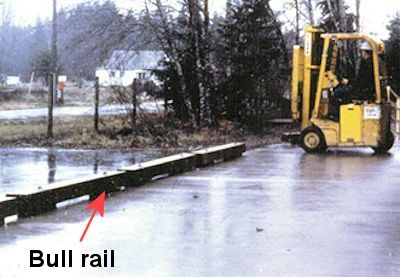Driving onto Trucks, Trailers, and Railroad Cars
Sometimes a trailer is left at a loading dock without the tractor attached. Use trailer jacks to prevent the trailer from up-ending when a forklift drives to the front of the trailer to load or unload.
Here are some additional loading and unloading procedures:
- Inspect the floor of the trailer to be sure that it will support the forklift and load.
- Ensure that the height of the entry door is adequate to clear the height of your vehicle, taking into consideration the height of the loading platform.
- Drive straight across the bridge plates when entering or exiting the truck trailer or railroad car.
- Use dock lights and headlights when working in a dark trailer.
- Sound the horn when entering or exiting the trailer.
- In determining the capacity of the trailer floor to support a forklift, consider various factors, including floor thickness and cross-member spacing or unsupported floor area. In general, the larger the unsupported area, the lower the forklift capacity the trailer will have for the same floor thickness.
- Never use the forklift to open railroad car doors unless:
- it has a device designed for that purpose
- the operator is trained in the use of the device
- all other employees stand clear
- Keep a safe distance from the edge of a loading dock or a ramp. The edge must be painted yellow or with alternating yellow and black diagonal stripes to warn of both the fall hazard and the potential to be crushed by a trailer backing into the dock.
- A portable dock board must be secured in place to prevent it from moving. Some boards have pins that are inserted into the sides and project below the board. This prevents the board from moving toward the dock or toward the trailer. To prevent crushed fingers and make for safe handling, a portable dock board must also have handholds or lugs that allow the forklift to pick it up.
- Some loading docks have a bull rail that prevents a wheel from slipping off the sides of ramps or edges of the dock where a forklift would not have to cross to enter a trailer.
- Any part of the dock edge that is four feet or more above the adjacent surface must have a standard guardrail. Removable rails (such as chain rails) and posts can be used at the place where trucks or trailers will be loaded.
- Use rail mounted chocks to secure a railroad car. Also, prevent anyone from moving the rail car while the forklift is working. A blue sign with the word "STOP" attached to the track is one way of signaling that the car must not be moved. A special attachment must be used if a forklift is used to open a rail car door.
Knowledge Check Choose the best answer for the question.
2-8. What do some loading docks have installed to prevent a wheel from slipping off the sides of ramps or edges of the dock where a forklift would not have to cross to enter a trailer?
You forgot to answer the question!


